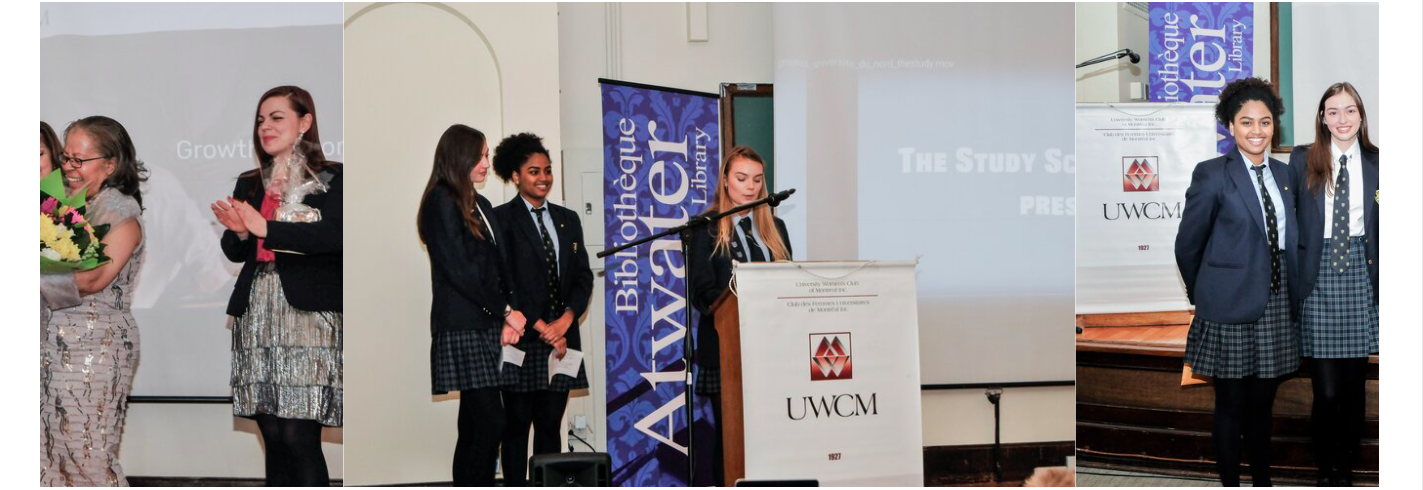
Édition 2017-2018
Thème
Les thèmes du concours scolaire Olympes de la Parole Canada s’alignent avec les objectifs de Développement Durable de l’Agenda 2030 des Nations Unies. La première édition reprit un des thèmes discuté lors de la Soixante - Deuxième Session de la Commission de la condition de la femme des Nations Unies (CSW 62) qui eut lieu à New York en mars 2018. Les participantes furent invitées à réfléchir sur :
" Comment l’accès aux nouvelles technologies peut contribuer à l’autonomisation des filles et femmes autochtones au Canada "
Gagnantes
Premier prix
Le premier prix fut décerné à l'équipe de l'établissement Villa Maria, représentée par : Aristi Constantopoulos, Eleanor Fenner, Julia MacDonald Edström, et Dalia Vita, pour leur projet : Using Raspberry Pi Technology to Disseminate Mental Health Information Amongst Nunavummiut Girls and Women.
Deuxième prix
Le deuxième prix avec Mention du Jury pour la meilleure dissertation fut décerné à l'équipe de l'établissement The Sacred Heart School of Montreal, représentée par : Daphne Giroux, Katalina Toth, et Daisy Smith, pour leur projet : Aboriginal women and empowerment via technology.
Deuxième prix ex-aquo
Le deuxième prix ex - aquo fut décerné à l'équipe de l'établissement The Study, représentée par : Lily Magny, Eloise Valasek, Lola Gomez - Ribeiro, Morgan Geyer, Cayla Cohen, et Mia Strack, pour leur projet : Université du Nord.
Troisième prix
Le troisième prix fut décerné à l'équipe de l'établissement The Study, représentée par : Isabella Walter, Jocelyn Ha, Delila Farias, Vivian Maas, et Lauren McKenzie, pour leur projet : The Importance of Education for Ikaluit Youth.
Témoignages
“ My participation in the Olympes de la Parole school competition provided an opportunity to understand the gaps in the Canadian social service system. I am now enrolled in McGill University’s School of Social Work, where I am continuing to develop an understanding of ways in which such systems can be improved through policy .”
— Dalia Vita, équipe participante de Villa Maria College, (2018).
“ Olympes de la Parole encouraged us to find ways of using simple technology to do the most good for Indigenous girls and women. This influenced my decision to start my university studies in the STEM field, to provide technological advancements that help the communities that need them. ”
— Aristi Constantopoulos, équipe participante de Villa Maria College, (2018).
“ I described the experience to someone as : floating 3 feet above ground because it was so uplifting. ”
— C. Hayes, CFUW - VP International Relations, (2018).
“This has been an incredible experience for us all. The girls have learned invaluable lessons about practical matters, such as the research, writing, and presentation processes, but above all, they got to exercise their innate compassion. As a teacher, witnessing their evolution as women, as leaders, and as compassionate, socially conscious citizens, has made this experience the gift of a lifetime.”
— M. Di Scala, enseignante principale, Villa Maria College, (2018).
“I can’t tell you how warming to the heart it was to see my Mohawk people involved in the opening and closing of the event. I was inspired by the energy these young women put towards solving pressing issues faced by Indigenous women in the North.”
— K. Cook, Special Advisor, Indigenous Initiatives, Office of the Provost and Vice-Principal (Academic), McGill University, (2018).
“When I hear what these young girls have to propose, I see a model of how to reconcile relationships between Canadians and the original people of this land.”
— D. Kahwinehtha Diome, Chairperson for Kahnawake Combined School Committee and member of the competition review panel, (2018).















